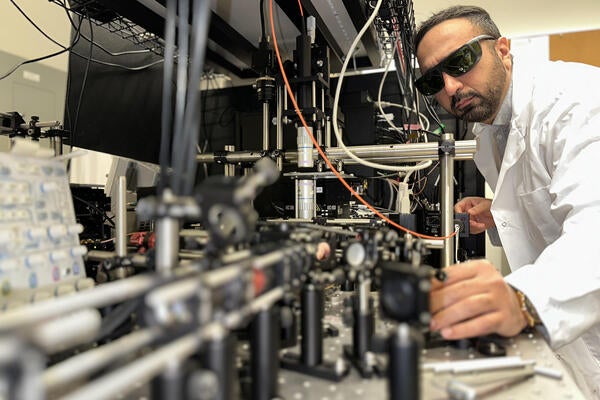WATERLOO, Ont. (Sunday, Feb. 19, 2012) - Leading scientists from organizations worldwide, including the University of Waterloo, launched a new report today that offers real-world strategies for addressing the world's energy challenges.
The Equinox Blueprint: Energy 2030 resulted from an innovative, multinational, interdisciplinary gathering on energy organized by the Waterloo Global Science Initiative (WGSI) that took place in Waterloo in June 2011. Feridun Hamdullahpur, president & vice-chancellor at Waterloo and board vice-chair of the WGSI, introduced the report at the American Association for the Advancement of Science (AAAS) Annual Meeting in Vancouver, one of the largest general science gatherings in the world.
"Meeting the world's demand for secure and sustainable sources of energy in the years to come without exacerbating climate change is one of the greatest challenges humanity will face this century," said Hamdullahpur. "This road map provides necessary pathways for humanity to follow today and tomorrow if we are to successfully navigate a low-carbon, electrified and sustainable future."
Jatin Nathwani, executive director of the Waterloo Institute for Sustainable Energy and an Ontario Research Chair, and Jason Blackstock, senior fellow at the Centre for International Governance Innovation (CIGI), were part of a panel presenting the recommendations of the Equinox Blueprint.
The recommendations in Equinox Blueprint: Energy 2030 include:
- Energy storage technologies to enable renewable electricity generation
- Enhanced geothermal by tapping into the Earth's heat using techniques already in use
- Advanced nuclear reactors for enhanced safety, using inexhaustible fuel resources
- Off-grid electrification using flexible solar cells and self-sustaining micro-grids
- Smart cities and electric transport for a global future dominated by urban living.
WGSI is a partnership between the University of Waterloo and the Perimeter Institute for Theoretical Physics. Its mandate is to challenge and address real-world issues and realize opportunities by harnessing the contributions that science and technology can make to transform our future.
About the University of Waterloo
In just half a century, the University of Waterloo, located at the heart of Canada's Technology Triangle, has become one of Canada's leading comprehensive universities with 34,000 full- and part-time students in undergraduate and graduate programs. Waterloo, as home to the world's largest post-secondary co-operative education program, embraces its connections to the world and encourages enterprising partnerships in learning, research and discovery. In the next decade, the university is committed to building a better future for Canada and the world by championing innovation and collaboration to create solutions relevant to the needs of today and tomorrow. For more information about Waterloo, visit www.uwaterloo.ca.








